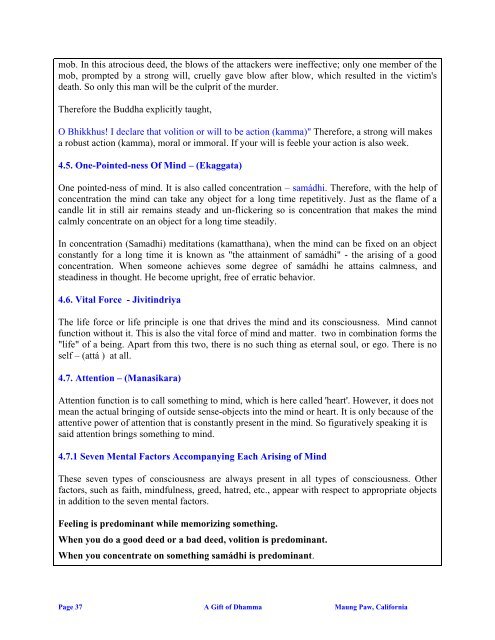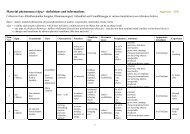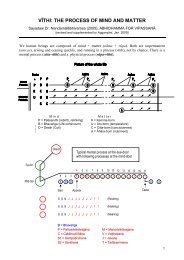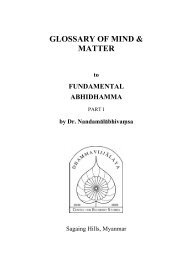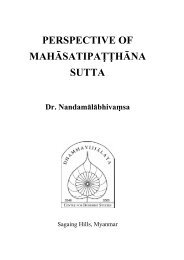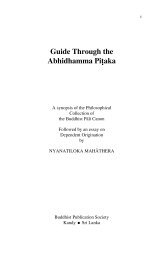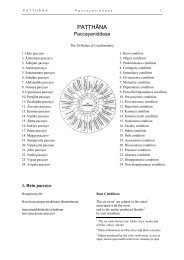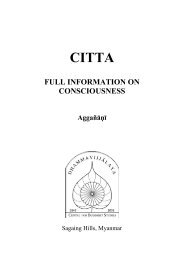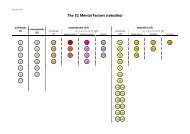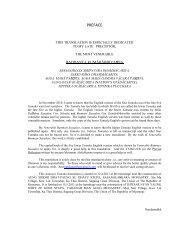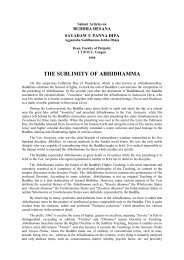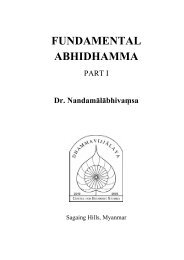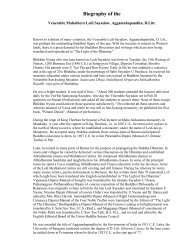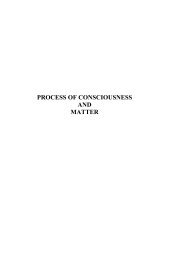ABHIDHAMMA IN DAILY LIFE - Abhidhamma.com
ABHIDHAMMA IN DAILY LIFE - Abhidhamma.com
ABHIDHAMMA IN DAILY LIFE - Abhidhamma.com
You also want an ePaper? Increase the reach of your titles
YUMPU automatically turns print PDFs into web optimized ePapers that Google loves.
mob. In this atrocious deed, the blows of the attackers were ineffective; only one member of the<br />
mob, prompted by a strong will, cruelly gave blow after blow, which resulted in the victim's<br />
death. So only this man will be the culprit of the murder.<br />
Therefore the Buddha explicitly taught,<br />
O Bhikkhus! I declare that volition or will to be action (kamma)" Therefore, a strong will makes<br />
a robust action (kamma), moral or immoral. If your will is feeble your action is also week.<br />
4.5. One-Pointed-ness Of Mind – (Ekaggata)<br />
One pointed-ness of mind. It is also called concentration – samádhi. Therefore, with the help of<br />
concentration the mind can take any object for a long time repetitively. Just as the flame of a<br />
candle lit in still air remains steady and un-flickering so is concentration that makes the mind<br />
calmly concentrate on an object for a long time steadily.<br />
In concentration (Samadhi) meditations (kamatthana), when the mind can be fixed on an object<br />
constantly for a long time it is known as "the attainment of samádhi" - the arising of a good<br />
concentration. When someone achieves some degree of samádhi he attains calmness, and<br />
steadiness in thought. He be<strong>com</strong>e upright, free of erratic behavior.<br />
4.6. Vital Force - Jivitindriya<br />
The life force or life principle is one that drives the mind and its consciousness. Mind cannot<br />
function without it. This is also the vital force of mind and matter. two in <strong>com</strong>bination forms the<br />
"life" of a being. Apart from this two, there is no such thing as eternal soul, or ego. There is no<br />
self – (attá ) at all.<br />
4.7. Attention – (Manasikara)<br />
Attention function is to call something to mind, which is here called 'heart'. However, it does not<br />
mean the actual bringing of outside sense-objects into the mind or heart. It is only because of the<br />
attentive power of attention that is constantly present in the mind. So figuratively speaking it is<br />
said attention brings something to mind.<br />
4.7.1 Seven Mental Factors Ac<strong>com</strong>panying Each Arising of Mind<br />
These seven types of consciousness are always present in all types of consciousness. Other<br />
factors, such as faith, mindfulness, greed, hatred, etc., appear with respect to appropriate objects<br />
in addition to the seven mental factors.<br />
Feeling is predominant while memorizing something.<br />
When you do a good deed or a bad deed, volition is predominant.<br />
When you concentrate on something samádhi is predominant.<br />
Page 37 A Gift of Dhamma Maung Paw, California


